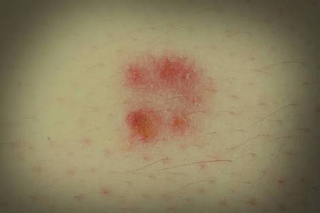Researchers at Johns Hopkins, the University of California, Davis, and the National Institute of Allergy and Infectious Diseases have discovered how the immune system might protect a person from recurrent bacterial skin infections caused by Staphylococcus aureus (staph). “There’s a huge, unmet clinical need for new approaches against staph skin infections because of declining antibiotic development and rising drug resistance,” says Lloyd Miller, M.D., Ph.D., associate professor of dermatology at the Johns Hopkins University School of Medicine.
Staph is a common bacterium and the most common cause of skin infections in people. Additionally, multidrug resistant strains, such as methicillin-resistant Staphylococcus aureus (MRSA), are causing severe skin infections in healthy people outside of hospitals. And once you’ve had an infection, the recurrence rate is 50 percent within six months. Staph can also spread from the skin and cause invasive and life-threatening infections such as sepsis, osteomyelitis and pneumonia.
Using mice with defective immune systems, research team found that after an initial exposure of the skin to staph, they were surprisingly protected against a second skin exposure with the same bacteria. After testing for antibodies and other usual suspects of the immune system against this infection, it was not clear what immune response was protecting the mice. The researchers then tested a drug FDA-approved for treatment of multiple sclerosis, which acts by preventing certain immune cells from leaving lymph nodes for sites of inflammation.
That genetic sequencing data revealed that specific cells substantially multiplied after the initial infection, then moved to the infection site and provided protection against the second infection. These so-called gamma delta T cells account for less than 1 percent of all the cells in the lymph node prior to infection. After infection, they accounted for more than 20 percent.
Working with collaborators from the National Institute of Allergy and Infectious Diseases at the National Institutes of Health, the researchers tested blood from healthy individuals and people with a rare immune disorder that makes them highly susceptible to staph skin infections. Half of people with the disorder die by age 10, but if they survive to adulthood they somehow overcome their susceptibility to staph infections.
In blood samples from these patients, the researchers found an increase in the percentage of gamma delta T cells, similar to what they observed in mice, which remained stable over years. The findings and especially gamma delta T cells may be targeted for developing new therapies or a vaccine against staph skin infections.


